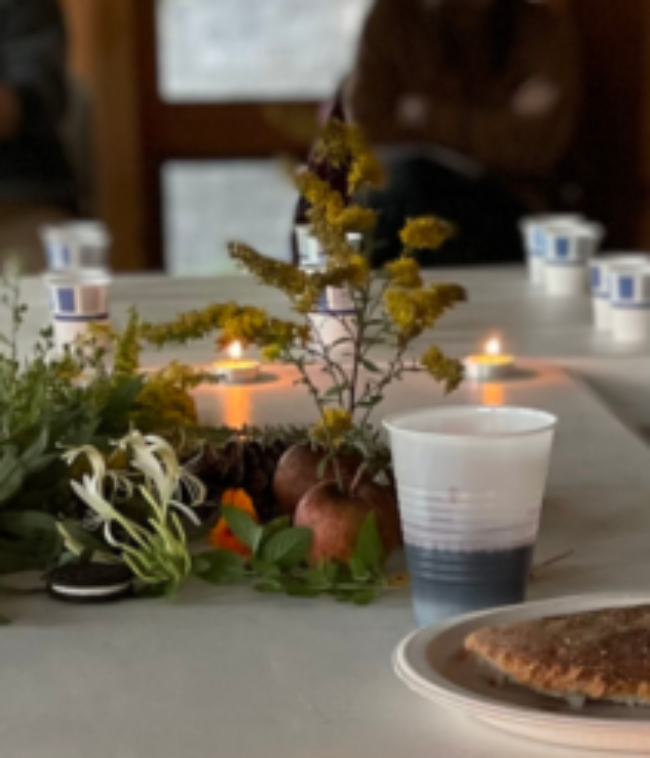Community Starts in the Heart
Blessed are the pure in heart, for they will see God. -Matt. 5:8
Pray without ceasing. -1 Thess. 5:16
“Community starts in the heart.” Could there be a more Hallmark way of talking about cultivating community? Maybe not. As Henri Nouwen observes in his little book The Way of the Heart, “In our milieu the word heart has become a soft word.”
But, what if we tried to disentangle all of the sentimentalities that we have attached to “heart” in twenty-first century Christian America? Not simply the romance novels and the Lifetime Original Movies, but also the religious rhetorics of “one heart and mind,” with all of the “life on life,” “life together,” and “building community,” ideologies it entails? What if “heart” was more than just one side of the sacred/secular coin through which we might imagine transcending the banalities of everyday life?
I can’t get away from one commentator’s helpful unpacking of “heart” as “unconscious desire.” This, to me, explains Jesus’s observation that “where your treasure is, there your heart will be also.” In other words, we don’t need Hallmark to tell us to follow our heart. We already do that. But the kicker is, we can oftentimes find ourselves befuddled with where our hearts bring us–anxious, depressed, angry, or bored. The majority of the time we don’t even realize how we got there.
Scripture tells us that the heart is deceitful above all things. This is also hypothesized in psychoanalytic literature, which explains that not only do we deflect daily intimacies through an unconscious process known as repression; our everyday actions, body language, and speech (mainly through slips of the tongue and off-handed jokes) actually reveal our repressed desires. In short, we wear our hearts on our sleeves. Our treasure isn’t buried in it. It’s hidden in plain sight.
So, what is that we treasure? Now we are squarely in the realm of desire and formation, and this is a key question for our work in Cultivating Communities. What have we identified as the sacred object that we imagine will fulfill our deepest held desires? How has cultivating theological imagination in this way shaped the life of our congregations? And have we held up a convenient signifier called “God,” or even “Jesus” to simply justify the treasures that we’ve unconsciously repressed? This phenomenon extends beyond our privately held intimacies into the public arena of religious life–Sunday worship, the economics of our liturgy, our habits with their conflicted use of time, and our tenuous relationship to space and place.
The point is, perhaps we may have presumed prematurely on the “agape” that sustaining healthy community demands. We must cultivate community with “eros.” Meaning, the embodied life of Jesus models for us a love born not out of duty, but by the slow draw into relational, even passionate, intimacy. Jesus desires the vulnerabilities of merciful relationships to the formalities of sacrifice (Matt. 9:13). We are thankful to be in partnership with our friends at the Ekklesia Project. Through their Congregational Formation Initiative, they have taught us about how “schooling desire” has everything to do with formation. With regards to how desire informs consumer behavior, which gives shape to our lives, we might say ‘we are what we eat.’ The questions become: What are we hungry for? What motivates us? What gets us going? What turns us on?
Ask anyone who knows me. I can be deeply out of touch with my feelings. Open your heart to me, and I may look at you and say, “I am Groot.” But this does not mean that the decisions I make in everyday life and the way I process the world around me are not driven by affective and emotional resonances. This is true with even the most scientific and rationalistic personalities. In fact, the less we are aware of how we are driven by affective motivators, the more repressed our desire is, and the less we understand why we do what we do. This is how unconscious desire works. We can say whatever, but what we really want is always right there on the surface. We act in the ways that fulfill us. None of us are free from the primal lure of dreams and fantasies.
Everybody wants healthy community. This basic desire is what makes us social human beings. That said, we also want a world that makes sense to us. We all want a life that is fulfilling. That is, we each have very particular images in our head about what the world should be like. In the literal sense, these are fantasies. When they become encapsulated in speech and circulated among others, these become ideologies. Ideologies come in all shapes, sizes, and moralities. But at the end of the day, no matter how appealing (i.e. “life on life,” “life together,” and “building community,”), they are still fantasies. They are still products of human imagination.
So what do we do with this seemingly abstract and perhaps nihilistic information? Well, it’s simple, really. Scripture tells us to pray without ceasing. And by this, I don’t think the Apostle Paul meant to babble off to God ad infinitum. In fact, Jesus himself warns against praying with many words. Rather, we must learn to pray within the heart. We must engage the Spirit at the level of our (unconscious) desire. We must receive the mind of Christ. We must seek a new heart and new mind altogether. Daily. Moment by moment. Unceasingly.
This is the hard work for the would-be disciple of Jesus. It is to courageously stand alone before Jesus in naked silence. Fantasies and dreams are a part of our humanness, but to take the time to practice suspending them, even for short periods, in order to commune with the Holy Spirit is the gift of partaking in the divine. This is the uniqueness of the incarnational gift of Jesus Christ. It is a life experienced in the body. It moves us from obsessions for sacred objects to a life of sacred subjectivity. In other words, we begin to move away from a zero-sum existence that trades intimacy and mutuality for wish-fulfillment and illusory projections. Rather, we begin to experience a gratitude born of abundance, in the knowledge that “the earth is the Lord’s, and all that is in it” (Ps. 24).
So, if you want to build community, become a community organizer. If you want to create spaces that facilitate building community, become a community developer. And if you want to cultivate the abundant life of community under Christ, learn to pray from the heart without ceasing. Then, as we shed the many layers we’ve enveloped ourselves in as a defense, the Spirit gives us the gift of Encounter. Encounter first with the Spirit of Jesus, and then, always, with those closest to us. There is nothing strategic about this. There is nothing technical about this. There is nothing efficient about this. The cultivation of community, or better, communion, in the Spirit is nothing short of an Event that springs from eternity within the everyday.
___________________________________________________________________
Josh Livingston is a writer and community developer currently residing in Indianapolis. He is a member of Englewood Christian Church/Mano de Amistad, the director of Cultivating Communities, and the author of Sunrays on the Beachhead of the New Creation (Wipf & Stock, 2021).





